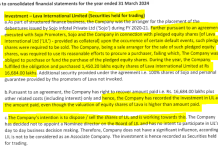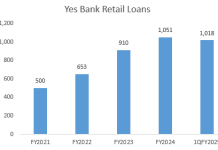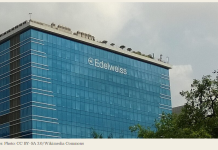
Hemindra Hazari 23/MAY/2017
Recently, Axis Bank and Yes Bank jolted the Indian banking community while releasing their annual results. Both banks disclosed a staggeringly large divergence between the banks’ audited accounts and the Reserve Bank of India’s (RBI) findings regarding bad loans on the books of these banks for the year ended March 31, 2016.
Against this background, the role of the auditor needs a closer look.
Surprisingly, in FY’2016, both Axis Bank and Yes Bank were audited by the same person, one Viren H. Mehta (membership number 048749). Mehta is a partner at Batliboi and Co., which in turn is a member firm of Ernst & Young. Some would call it strange for the same auditor to audit competing banks in the same year. What is even more unusual is that the accounts certified of both the banks by the same, individual statutory auditor have been found misleading by the statutory regulator.
Since the disclosure of the quantum of non-performing asset (NPA) divergence, Axis Bank has under-performed the Sensex-30 by 4.8% and Yes Bank by 10.2%, causing a loss to shareholders and a greater loss of credibility to the senior management and auditors of both the banks.
The credibility of the senior management and the auditor of Axis and Yes Bank took a beating when the RBI issued a notification on April 18, 2017 entitled “Disclosure in the “Notes to Accounts” to the Financial Statements- Divergence in the asset classification and provisioning,” specifically dealing with such cases, where there is considerable variance between gross NPAs reported by banks in their annual accounts and NPAs which are identified by RBI inspection teams. An excerpt from the notification states,
“There have been instances of material divergences in banks’ asset classification and provisioning from the RBI norms, thereby leading to the published financial statements not depicting a true and fair view of the financial position of the bank… it has been decided that banks shall make suitable disclosures as per Annex, wherever either (a) the additional provisioning requirements assessed by RBI exceed 15 percent of the published net profits after tax for the reference period or (b) the additional Gross NPAs identified by RBI exceed 15 percent of the published incremental Gross NPAs for the reference period, or both.”
Divergence in FY’2016 Gross NPAs
| Rs crores | Axis | ICICI | Yes |
| Gross NPAs Reported | 6,088 | 26,221 | 749 |
| Gross NPAs by RBI | 15,566 | 31,326 | 4,926 |
| Divergence | 9,478 | 5,105 | 4,177 |
| Change (%) | 155.7 | 19.5 | 557.7 |
Amongst the three new private sector banks which have till date disclosed divergence exceeding the 15% specified by RBI, Axis Bank and Yes Bank at 1.6x and 5.6x respectively are very clearly outliers. When news of Yes Bank’s underreported NPAs broke, the bank issued a statement saying that “with ongoing remedial actions undertaken… there have been several reductions/exists/partial sale to ARCs/improvements in account conduct which significantly reduced the overall gross NPA outstanding to Rs 1039.9 crore as on March 31, 2017”
Nevertheless, the misrepresentation and divergence in the audited accounts signed by the banks’ board of directors, including the chief executive officer and the chief financial officer, should prompt a number of questions. Should Mehta, as the auditor, have cautioned shareholders and the public with dissenting remarks in the auditor’s report in FY’2016? After all, in aggregate, it appears that a single auditor of a member firm of Ernst and Young has overlooked gross NPAs of a staggering Rs 13,655 crore.
When there is such a significant NPA divergence, market watchers say that a needle of suspicion often points toward rampant ‘evergreening’, wherein banks provide additional credit facilities to the same or related borrowers so that it could maintain the accounts as standard and not NPA. The RBI-appointed P.J. Nayak Committee to Review the Governance of Boards in India (May 2014) in its report stated,
“[if] significant evergreening is detected by RBI supervisors, it must mean that evergreening is wilful, with support from sections of the senior management of the bank.”
In the case of Axis Bank and Yes Bank, if the RBI manages to unearth evidence of evergreening, the auditor could either be considered ignorant or complicit and the shareholders and regulators should be required to take action to maintain the credibility of the institution.
Two separate detailed questionnaires pertaining to the audits of Axis Bank and Yes Bank were sent to Mehta, on different dates, to understand the divergence in the gross NPAs between the audited accounts and the RBI inspection. Batliboi & Co. (member firm of Ernst & Young) declined to acknowledge the Axis Bank query but instead responded to the Yes Bank questionnaire and said,
“We would like to state that the audit was conducted and the audit report issued in accordance with the Standards on Auditing, issued by the Institute of Chartered Accountants of India [ICAI], as specified under Section 143(10) of the Companies Act, 2013.”
The audit’s firm’s generalised reply to specific queries raised pertaining to the divergence does not address the issue of how complying with the ICAI’s standards resulted in the huge divergence between the auditor and the RBI. Their defence appears incomplete as the ICAI every year prior to the statutory bank audit releases a guidance note to its members on audit of banks where it specifies that all RBI guidelines have to be meticulously complied with. A divergence of such a magnitude appears, on the face of it, to be a gross violation of RBI’s asset classification, income recognition and provisioning norms.
The new private sector banks, unlike government banks, regularly seek additional global financial capital and prefer, for international credibility, to be audited by the ‘Big Four Audit Firms’: Deloitte, Pricewaterhouse Coopers (PWC), Ernst and Young and KPMG. However as PWC was the auditor of scam-tainted Satyam Computers and the erstwhile Global Trust Bank, the RBI had for a period of time effectively blacklisted the firm from auditing Indian banks. Therefore, only the remaining three can audit, via rotation, the new private sector banks. The preference for the remaining ‘Big Three’ is ostensibly to provide greater international credibility to the accounts of the new private sector banks.
For an Ernst and Young member auditor to simultaneously certify not one but two of such divergent banks is quite peculiar. Despite the RBI divergence being known by December 31, 2016, the Axis Bank senior management reaffirmed their faith and permitted the same auditor to continue to audit FY’2017 accounts as well.
When this writer reached out to Axis Bank with a questionnaire, the bank replied that it had made “true, fair and full provisions on said dates in accordance with the RBI guidelines in force”.
“However, the RBI being entitled to call its charges to take such further steps as may be necessary, called Indian banks to make new disclosures as per RBI circular dated 18th April, 2017. The ‘divergence’ that you aver is the outcome of RBI’s annual assessment of all banks. For a better understanding of the matter, and to draw meaningful conclusions, may we advise you to please observe similar disclosures of rest of the banking system,” Axis Bank said in a statement.
The “similar disclosures” in other banks in the private sector, so far reveals only Yes Bank has surpassed Axis Bank in the percentage divergence in NPAs and both banks have been audited by the same auditor. The regulators – RBI, Securities and Exchange Board of India, Company Law Board and the ICAI – need to evaluate the conduct and quality of the audits of Axis Bank and Yes Bank in FY2016 by Batliboi and Co. in order to restore public confidence.
Authoring an article on December 23, 2012 , Viren H. Mehta had argued for the disclosure of risk-related measures as a means to improve corporate governance in banks and as an “obligation to stakeholders.” More than four years later, a similar disclosure by the RBI on NPA divergence has cast him in the spotlight.













